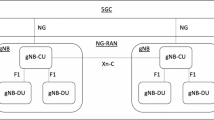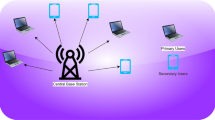Abstract
We consider networks of small, autonomous devices that communicate with each other wirelessly. Minimizing energy usage is an important consideration in designing algorithms for such networks, as battery life is a crucial and limited resource. Working in a model where both sending and listening for messages deplete energy, we consider the problem of finding a maximal matching of the nodes in a radio network of arbitrary and unknown topology. We present a distributed randomized algorithm that produces, with high probability, a maximal matching. The maximum energy cost per node is \(O\big ((\log n)(\log \Delta )\big ),\) and the time complexity is \(O(\Delta \log n)\). Here n is any upper bound on the number of nodes, and \(\Delta \) is any upper bound on the maximum degree; n and \(\Delta \) are parameters of our algorithm that we assume are known a priori to all the processors. We note that there exist families of graphs for which our bounds on energy cost and time complexity are simultaneously optimal up to polylog factors, so any significant improvement would need additional assumptions about the network topology. We also consider the related problem of assigning, for each node in the network, a neighbor to back up its data in case of eventual node failure. Here, a key goal is to minimize the maximum load, defined as the number of nodes assigned to a single node. We present an efficient decentralized low-energy algorithm that finds a neighbor assignment whose maximum load is at most a polylog (n) factor bigger that the optimum.


Similar content being viewed by others
Notes
We note that this is not a necessary condition. If v sends a message and two of its neighbors w and x both decide to listen, it could still happen that only w receives the message, because some vertex in \(N(x) {\setminus } N(w)\) sends a message at the same time as v, thereby causing a fortuitous collision at x.
References
Bar-Yehuda, R., Goldreich, O., Itai, A.: Efficient emulation of single-hop radio network with collision detection on multi-hop radio network with no collision detection. Distrib. Comput. 5(2), 67–71 (1991)
Bar-Yehuda, R., Goldreich, O., Itai, A.: On the time-complexity of broadcast in multi-hop radio networks: an exponential gap between determinism and randomization. J. Comput. Syst. Sci. 45(1), 104–126 (1992)
Barnes, M., Conway, C., Mathews, J., Arvind, D.K.: Ens: an energy harvesting wireless sensor network platform. In: 2010 Fifth International Conference on Systems and Networks Communications, pp. 83–87. IEEE (2010)
Bender, M.A., Kopelowitz, T., Pettie, S., Young, M.: Contention resolution with constant throughput and log-logstar channel accesses. SIAM J. Comput. 47(5), 1735–1754 (2018)
Chang, Y.-J., Dani, V., Hayes, T.P., He, Q., Li, W., Pettie, S.: The energy complexity of broadcast. In: Proceedings of the 2018 ACM Symposium on Principles of Distributed Computing, pp. 95–104 (2018)
Chang, Y.-J., Dani, V., Hayes, T.P., Pettie, S.: The energy complexity of BFS in radio networks. In: Proceedings of the 39th Symposium on Principles of Distributed Computing, pp. 273–282 (2020)
Chang, Y.-J., Duan, R., Jiang, S.: Near-optimal time-energy trade-offs for deterministic leader election. In: Proceedings 33rd ACM Symposium on Parallelism in Algorithms and Architectures (SPAA), pp. 162–172 (2021)
Chang, Y.-J., Kopelowitz, T., Pettie, S., Wang, R., Zhan, W.: Exponential separations in the energy complexity of leader election. ACM Trans. Algorithms 15(4), 49:1-49:31 (2019)
Chatterjee, S., Gmyr, R., Pandurangan, G.: Sleeping is efficient: Mis in \(o(1)\)-rounds node-averaged awake complexity. In: Proceedings of the 39th Symposium on Principles of Distributed Computing, pp. 99–108 (2020)
Czygrinow, A., Hanćkowiak, M., Szymańska, E., Wawrzyniak, W.: On the distributed complexity of the semi-matching problem. J. Comput. Syst. Sci. 82(8), 1251–1267 (2016)
Duan, R., Pettie, S.: Linear-time approximation for maximum weight matching. J. ACM 61(1), 1–23 (2014)
Harvey, N.J.A., Ladner, R.E., Lovász, L., Tamir, T.: Semi-matchings for bipartite graphs and load balancing. J. Algorithms 59(1), 53–78 (2006)
Heinzelman, W.R., Chandrakasan, A., Balakrishnan, H.: Energy-efficient communication protocol for wireless microsensor networks. In: Proceedings of the 33rd Annual Hawaii International Conference on System Sciences, pp. 10–pp. IEEE (2000)
Jurdzinski, T., Kutylowski, M., Zatopianski, J.: Efficient algorithms for leader election in radio networks. In: Proceedings of the 21st Annual ACM Symposium on Principles of Distributed Computing (PODC), pp. 51–57 (2002)
Jurdzinski, T., Kutylowski, M., Zatopianski, J.: Energy-efficient size approximation of radio networks with no collision detection. In: Proceedings of the 8th Annual International Conference on Computing and Combinatorics (COCOON), pp. 279–289 (2002)
Jurdzinski, T., Kutylowski, M., Zatopianski, J.: Weak communication in radio networks. In: Proceedings of the 8th International European Conference on Parallel Computing (Euro-Par), pp. 965–972 (2002)
Kardas, M., Klonowski, M., Pajak, D.: Energy-efficient leader election protocols for single-hop radio networks. In: Proceedings of the 42nd International Conference on Parallel Processing, pp. 399–408 (2013)
König, D.: Über graphen und ihre anwendung auf determinantentheorie und mengenlehre. Mathematische Annalen 77(4), 453–465 (1916)
Moscibroda, T., Wattenhofer, R.: Maximal independent sets in radio networks. In: Proceedings of the 24th Annual ACM Symposium on Principles of Distributed Computing, pp. 148–157 (2005)
Nakano, K., Olariu, S.: Energy-efficient initialization protocols for single-hop radio networks with no collision detection. IEEE Trans. Parallel Distrib. Syst. 11(8), 851–863 (2000)
Polastre, J., Szewczyk, R., Culler, D.: Telos: enabling ultra-low power wireless research. In: Proceedings of the Fourth International Symposium on Information Processing in Sensor Networks, pp. 364–369. IEEE (2005)
Wang, X., Song, X., Yuan, J.: On matching cover of graphs. Math. Program. 147(1), 499–518 (2014)
Zito, M.: Small maximal matchings in random graphs. Theor. Comput. Sci. 297(1–3), 487–507 (2003)
Acknowledgements
The authors would like to thank the anonymous referees of the conference version of this paper for helpful comments and suggestions. The second and third authors were partially supported by NSF Grant CCF-1150281. The fourth author was partially supported by NSF Grant CCF-1815316.
Author information
Authors and Affiliations
Corresponding author
Additional information
Publisher's Note
Springer Nature remains neutral with regard to jurisdictional claims in published maps and institutional affiliations.
Rights and permissions
About this article
Cite this article
Dani, V., Gupta, A., Hayes, T.P. et al. Wake up and join me! An energy-efficient algorithm for maximal matching in radio networks. Distrib. Comput. 36, 373–384 (2023). https://doi.org/10.1007/s00446-022-00426-w
Received:
Accepted:
Published:
Issue Date:
DOI: https://doi.org/10.1007/s00446-022-00426-w




